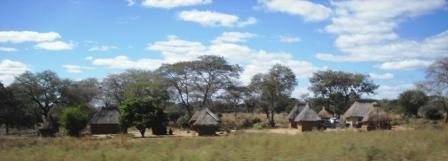
Village Compound
Religion in Zambia
The last few blogs have been mainly reporting with pictures, but without much commentary. I had limited internet connection and limited time. Today was 13 ½ hours by bus from Livingstone to Ndola, so I had some time to think.
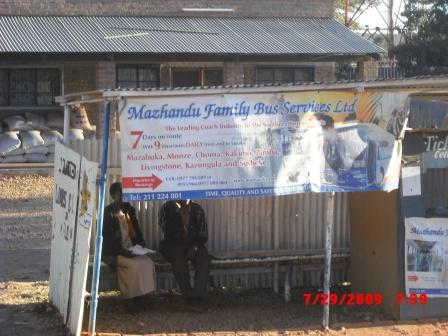
Bus Stops
Religion is very public in Zambia. Most of the minibuses have religious slogans or logos at the top of the windshield or on the back window. Stores and other businesses often have Hebrew Biblical names. Some have Biblical texts on their buildings or signs. There is often Christian music playing in the stores and restaurants. There was Christian music playing through the speakers on the bus. Some was in a different language, but I could recognize the Divine Names used. One of my seatmates ringtone on his phone was a Christian hymn tune.
I was prompted to reflect on this because as I loaded on the bus in Livingstone at 5:30, I was soon greeted with an evangelistic sermon from a Pentecostal preacher. Interestingly, he basically presented the Roman Road, which I had commented on a few blogs ago. His message had the basics of the Gospel, but it was also very much about getting to heaven as the primary goal of the Gospel. Much of the Christianity is a “soul saving,” world flight, going to heaven after death type. The songs are often of the “I’ll Fly Away,” old Country Gospel, variety. I did appreciate the pastor’s prayer for safe travel and even his declaration against any witchcraft or demons on the bus in the name of Jesus. I was concerned when he kept preaching as the bus left the station, but he got off at the police checkpoint on the outskirts of town.
The prayer against witchcraft and demons did catch my attention more because of two discussions I had had in Lusaka. The brother of the business manager at Northrise who had set up the guest house for me, Hamoonga Choongo, and I had dinner on Thursday night. He is studying at Jackson State University in Mississippi for a doctorate in management and leadership. His real passion is the psychology of religion as it relates to demon possession and witchcraft. His wife was under the power of witchcraft practiced by her father and an aunt against her for the first 30 years of her life. She now speaks throughout the US on the reality of witchcraft and evil powers. I commented that I do not understand this area even though I believe there are evil forces and powers. I focus on the Good News that they have been defeated in Christ and that we do not need to fear them.
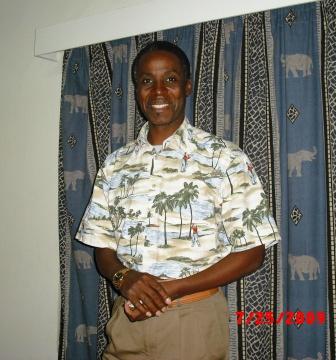
Hamoonga Choongo
On Saturday morning one of the professors at Justo Mwale Theological College stopped into the guest house for a chat. He had done his Masters of Theology at Calvin Seminary and written on demon possession and exorcism. He said that the professors at Calvin really did not believe in either one. At first the Reformed Church of Zambia did not either, but now he has gotten them to address the issue of demon possession through the ministry of the church. We agreed that Western Christianity has gone too far in rejecting the idea of evil spirits and forces by secularizing it and making it all medical disorders or mental illness, and that the danger in Africa is to make every problem related to evil spirits and giving them too much power.
The rest of the ride to Lusaka was uneventful. There were no evil spirits active that I could tell. The 45 minute bumpy, dusty detour was still there. I did make sure I sat on the side of the bus so I would see the other side of the road from the one on my trip in. There were more little villages and compounds with the round huts and thatched roofs on this side of the road.
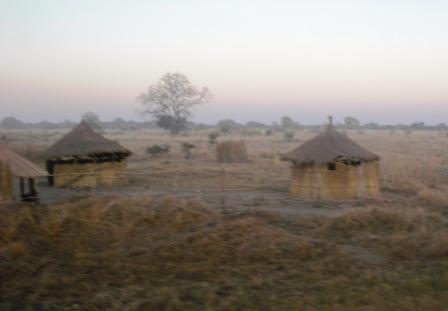
Huts in Morning Mist
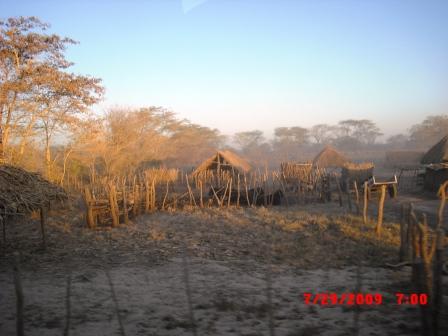
Corral
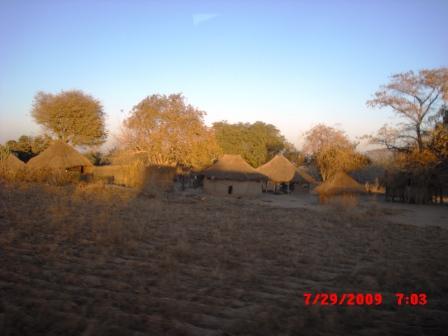
Compound

Roadside Market
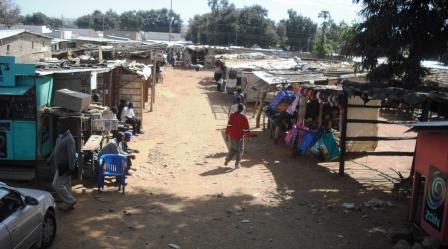
Monze Market
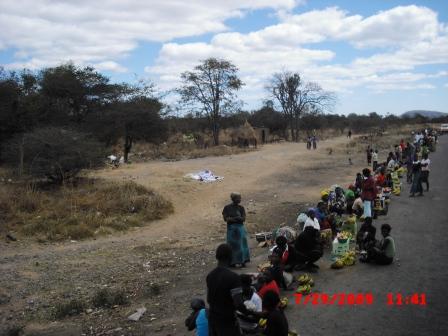
Bus Stop Market
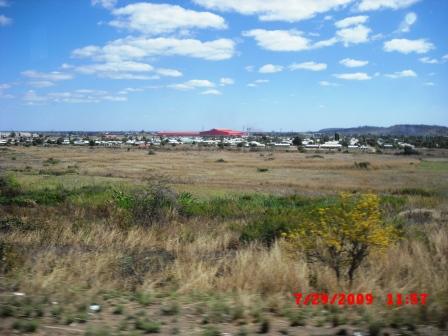
Mazabuka
When I got into Lusaka, the 1 pm bus was full. I had to wait over an hour for the next bus. I could have walked around the area some more, but I had no desire to see more of Lusaka. Again as we were about to leave the station, a man got up, offered a prayer and started preaching. Again I appreciated the prayer, but his message was more a distortion of the Bible into the Health and Wealth message. According to him, God will give you everything and anything you ask for in faith and allow you to do everything you desire. It was a good example of taking verses out of context and then using the literal words to say anything you want them to say. I was also troubled that he took a collection. The first preacher had rejected this action.
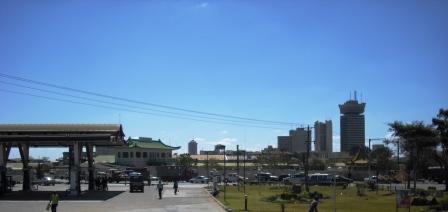
Coming into Lusaka
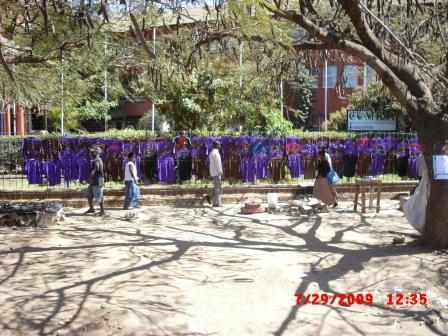
Lusaka Shirt Shop
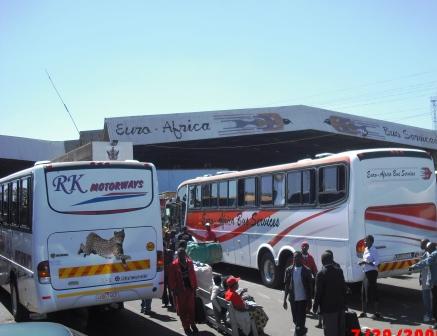
Bus to Ndola
I mentioned to my seat-mate that I was having a hard time with some of the things the preacher was saying. This started an interesting 4-5 hour conversation. He was also a minority, but quite different than I. He was an Indian Hindu who was starting a soy oil processing business in Kitwe, where he had lived since the age of 15. I am guessing that was for about 20 years.
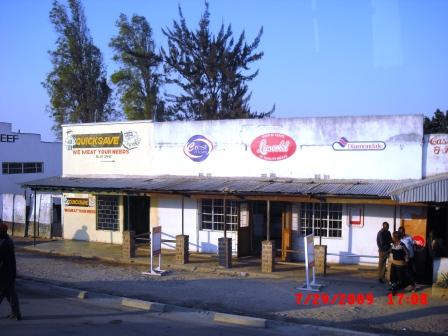
Kipiri Mposhi
We discussed the similarities and differences between Christianity and Hinduism, along with being a minority in Zambia and Zambian culture. We agreed a great deal on the human problem. People are basically selfish and seek personal material gain by power and often violence, even if it is subtle violence of dishonesty and corruption. We agreed on a general view of God as the creator whose purposes should be served in the world by humans. We then discussed the primary Hindu gods of Krishna, Vishnu, Shiva, and Ganesha. I pointed out the similarities of the idea of a son of God that mediates human prayers. I commented on the oneness of God. He in part agreed because he is a henotheistic Hindu, believing in one chief god.
In talking about the Hindu story, I pointed out the major difference in how God deals with evil in the two faiths. In Hinduism Krishna gave his five original followers permission to kill those who were doing evil. In Christianity God’s Son receives the evil and does not strike back. I fear my discussion partner was more interested in talking than listening. I am not sure he understood the points I made about Christianity.
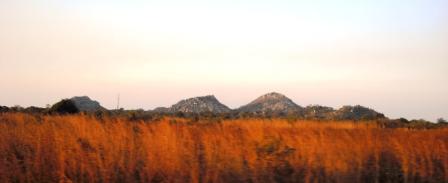
Kapiri means mountain
We talked about reincarnation in contrast to recreation. We discussed Karma and the principles of divine justice. This led into the ideas of forgiveness and repentance. It seems to me that Hinduism has a place for human repentance, but not forgiveness from God. God is very much the judge in Hinduism. Also, I stated that Karma seemed too deterministic to me, and we agreed that both our faiths have to wrestle with God’s purposes and human freedom and responsibility.
We also mostly agreed on ethics and the concept of prayer. Humans should serve the purposes of God in the world by loving, serving, and respecting each other. We had a very respectful discussion and were seeking to serve each other.
Humans should be humble before God, realizing that we are not in control of this world. The Hindu morning prayer is basically to serve God in the day. The evening prayer is to reflect on the day and what one did in service and what one could have done better. Here it seemed to me that Hinduism becomes a works righteousness religion.
When we talked about Zambian culture, my seat-mate expressed what I would consider some prejudices. He saw Zambians as hard working, but without vision or desire to improve things. He felt Zambians had no life, no sense of family activity and no real purpose. The major problem he saw was dishonesty and theft at all levels of the society, especially among governmental leaders. Again we were back to the problem of human selfishness, seeking to gain for oneself without concern for others.
We agreed on the problem, but not on the solution. Yet it troubled me that if many Zambians are Christians and even consider their nation to be a Christian nation, why are dishonesty, corruption, and a general lack of integrity seen as major problems. Christianity is first about a new relationship with God and your neighbor now in this life before the benefits of life in a new creation. I stated that I did not understand human sin, but that in the Gospel I saw hope for forgiveness for humanity now and change for the whole world now and in the future through the power of Christ’s victory and God’s Spirit.
There are many things I wish I would have said better or more clearly. We both agreed that it is not up to us to change someone. That idea is behind much of the religious violence in the world today. All we can do is present our views. I said it was up to God to change a person. My partner said it was up to the person to decide to change. This did not fully fit with all things being planned by God, but this man said that as a Hindu he believes our meeting and discussion was not by accident. According to him, we might have met in another life or might meet again in the next. I said that is not how I saw it, but I agreed that such discussions are not by accident.

Dinner and internet waiting at the Flat

